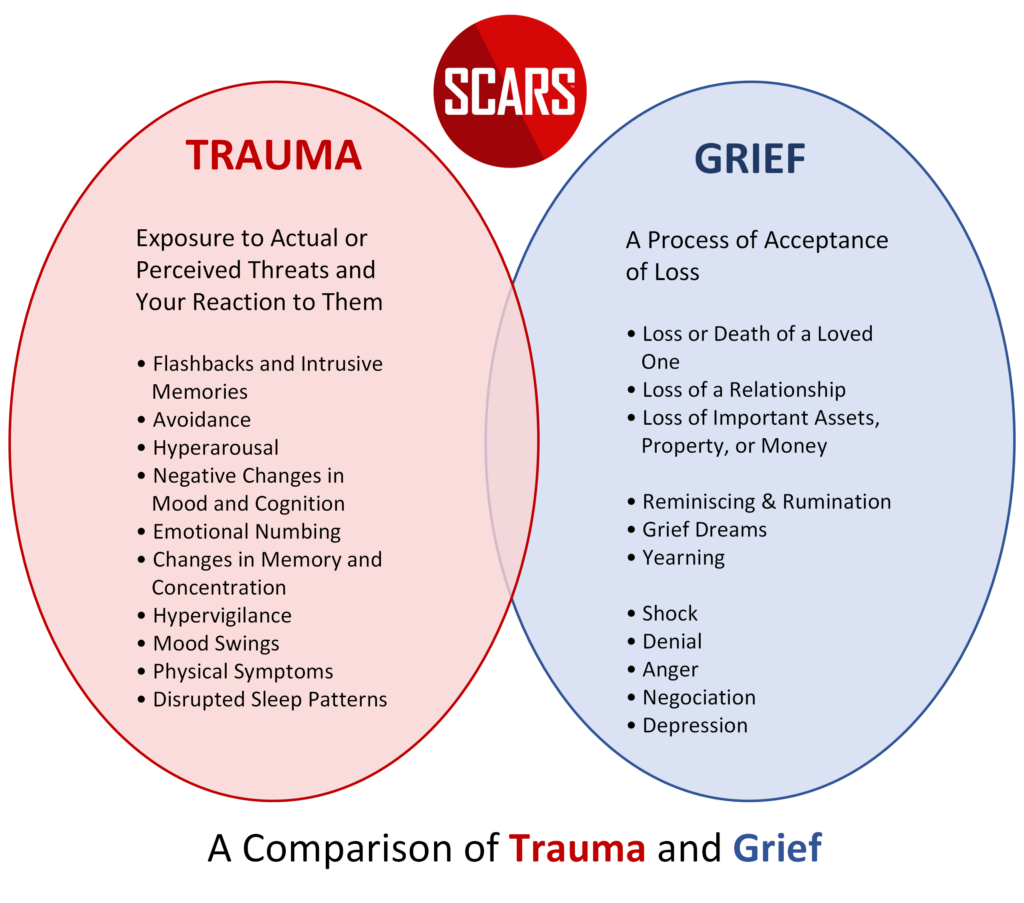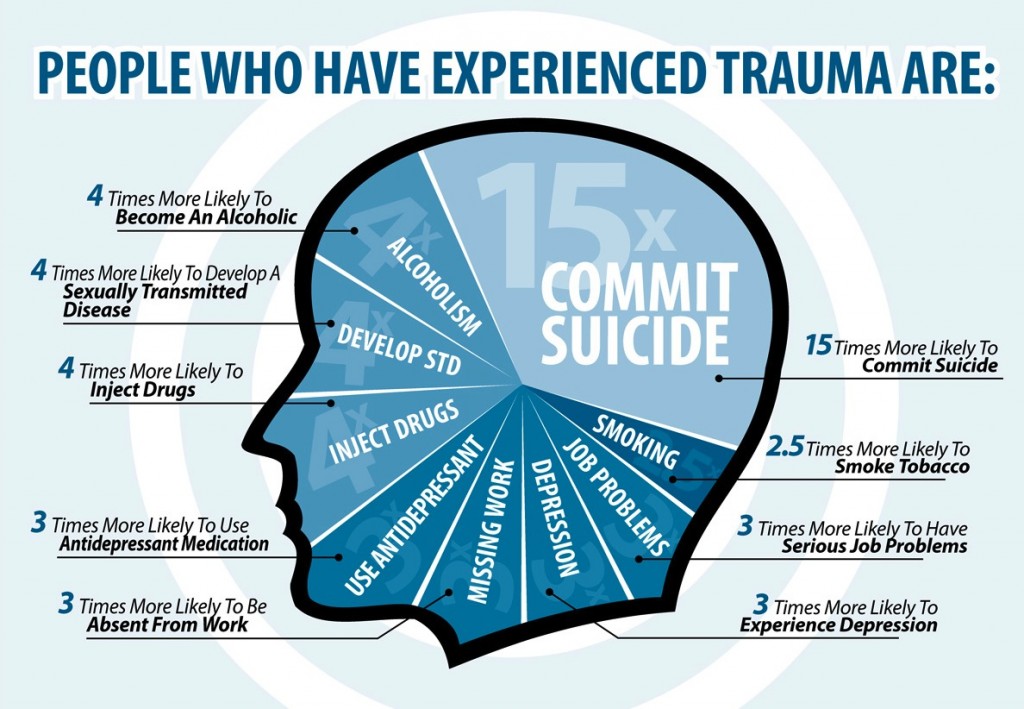What Is The Difference Between Trauma And Grief?
Helping Scam Victims Understand the Importance of Trauma and How to Prioritize It
Authors:
• Vianey Gonzalez B.Sc(Psych) – Licensed Psychologist Specialty in Crime Victim Trauma Therapy, Neuropsychologist, Certified Deception Professional, Psychology Advisory Panel & Director of the Society of Citizens Against Relationship Scams Inc.
• Tim McGuinness, Ph.D. – Anthropologist, Scientist, Director of the Society of Citizens Against Relationship Scams Inc.
About This Article
This article’s discussion sheds light on the intricate nature of trauma, emphasizing its dual impact as both a psychological and physical injury. Trauma disrupts normal brain functioning, leading to cognitive, emotional, and memory disturbances, while also causing changes in brain structure and chemistry.
This psychological toll manifests in symptoms like hypervigilance and mood disturbances. Moreover, trauma elicits physical responses such as headaches and muscle tension, stemming from the body’s stress response mechanisms. Recognizing trauma’s multifaceted nature underscores the importance of holistic approaches to healing and recovery, addressing both psychological and physical aspects to promote comprehensive well-being.
The Conflict in Scam Victim’s Minds over Trauma and Grief
Trauma and Grief in Scam Victims
Trauma survivors, such as Scam Victims, often struggle to differentiate between trauma and grief due to the complex and overlapping nature of these experiences.
Here’s why it can be challenging for scam victims, in particular, to understand the difference between trauma and grief, as well as the order in which they need to be addressed:
- Complexity of Emotions: Scam victims experience a wide range of emotions, including shock, disbelief, anger, sadness, guilt, and shame. These emotions can be intertwined and overwhelming, making it difficult to identify specific feelings associated with trauma or grief.
- Ambiguity of Loss: Scam victims experience a sense of loss not only for the financial or material resources they’ve lost but also for loss of the relationship that helped to destroy their sense of security, trust, and well-being. This ambiguity of loss can blur the lines between trauma and grief, as victims struggle to make sense of their experiences and come to terms with their losses.
- Betrayal and Violation: Scam victims often experience a profound sense of betrayal and violation, as they realize that they have been deceived and manipulated by someone they trusted. This betrayal trauma can evoke feelings of grief for the loss of trust and the shattered sense of security, as well as trauma-related symptoms such as hypervigilance, flashbacks, and avoidance.
- Disruption of Identity: Scam victims may also experience a disruption of their sense of identity and self-concept, as they grapple with feelings of shame, self-blame, and inadequacy. This existential crisis can exacerbate feelings of grief for the loss of the self they once knew and deepen the psychological impact of the trauma.
- Timing of Processing: Scam victims will prioritize addressing the immediate practical and financial consequences of the scam, such as reporting the crime, seeking restitution, and recovering stolen assets. As a result, they may delay or neglect to address the emotional and psychological aspects of their experience, including grief and trauma, until they feel more stable and secure, which helps to confuse or even hide the trauma.
- Stigma and Shame: Scam victims also experience stigma and shame associated with being victimized, which can make it difficult to acknowledge and seek support for their emotional struggles. They may fear judgment or blame from others, leading them to suppress or minimize their feelings of grief and trauma.
- Trauma Bias: Scam victims often associate trauma with mental illness, when in fact i is an injury. Whereas Grief is viewed (at least now) as a normal emotional response and not stigmatizing.
Trauma vs. Grief
Psychological trauma and grief in scam victims are both emotional experiences that can have profound effects on individuals, but they differ in their clinical presentation and underlying causes:
-
Psychological Trauma in Scam Victims:
- Definition: Psychological trauma refers to the psychological injury with its emotional responses to a distressing or disturbing event that overwhelms an individual’s ability to cope. Traumatic events can include experiences such as accidents, natural disasters, violence, abuse, or witnessing traumatic events.
- Clinical Features: Trauma often leads to a range of emotional and psychological symptoms (as well as physical,) including flashbacks, nightmares, intrusive thoughts, hypervigilance, avoidance behaviors, emotional numbing, difficulty concentrating, irritability, and heightened anxiety or arousal.
- Underlying Mechanisms: Trauma results from the perception of threat or harm to oneself or others, leading to a dysregulated stress response and alterations in brain functioning. Traumatic experiences can disrupt one’s sense of safety, trust, and self-esteem, leading to profound emotional and psychological distress that is at the heart of this injury.
- Physical Not Just Emotional: Trauma: Trauma is a whole-body experience that manifests as both a psychological and physical injury, leaving a profound impact on individuals’ overall health. Psychologically, trauma disrupts the brain’s normal functioning, altering cognitive processes, emotional regulation, and memory encoding. It can lead to symptoms such as hypervigilance, intrusive thoughts, flashbacks, and mood disturbances, which significantly impair individuals’ ability to function and cope with daily life. Moreover, trauma can cause changes in brain structure and chemistry, affecting regions associated with stress response, emotion processing, and fear conditioning. Physically, trauma can manifest as somatic symptoms such as headaches, muscle tension, gastrointestinal distress, and cardiovascular problems. These physical manifestations often stem from the body’s physiological response to stress and trauma, including heightened arousal (usually of the amygdala), dysregulated autonomic nervous system activity, and chronic inflammation. Thus, trauma represents a complex interaction between psychological and physical processes, highlighting the need for comprehensive approaches to healing and recovery.
-
Grief in Scam Victims:
- Definition: Grief is the emotional response to the loss of a significant person or relationship. It is a natural and normal reaction to the experience of loss and encompasses a range of emotions, including sadness, longing, anger, guilt, and regret.
- Clinical Features: Grief typically involves a process of mourning and adjustment to the loss, characterized by emotional fluctuations and periods of intense sadness interspersed with moments of acceptance and meaning-making. The intensity and duration of grief can vary widely among individuals and may be influenced by factors such as the nature of the loss, the individual’s coping skills, and their support network.
- Underlying Mechanisms: Grief is a complex emotional process that involves coming to terms with the reality of the loss, adjusting to life without the deceased, and finding ways to integrate the loss into one’s ongoing narrative of life. It often involves a search for meaning and purpose in the face of loss and may lead to personal growth and transformation over time.
While psychological trauma and grief share some overlapping symptoms, such as sadness and emotional distress, they differ in their underlying causes and clinical presentations. Trauma is typically characterized by the overwhelming response to a threatening or harmful event, whereas grief arises in response to the loss of a significant person or relationship. Understanding these differences is essential for providing appropriate support and interventions to individuals experiencing trauma or grief. It is generally not possible to properly process grief without learning to manage the underlying trauma.
Trauma as an Injury in Scam Victims
Psychological trauma is usually considered an injury, that affects mental and emotional well-being as well as physical health. Psychological trauma results from exposure to distressing or disturbing events that overwhelm an individual’s ability to cope, leading to profound emotional and psychological distress, as well as physical symptoms that can become permanent.
While physical injuries are typically visible and tangible, psychological trauma manifests as invisible wounds that affect mental and emotional functioning. Trauma can have a significant impact on various aspects of an individual’s life, including their thoughts, feelings, behaviors, relationships, and overall quality of life – both psychological and physical.
Psychological trauma can result from a wide range of experiences, including:
- Crimes: Being the victim of a crime – from burglary to fraud.
- Accidents: Involvement in or witnessing accidents, such as car crashes or industrial accidents.
- Natural Disasters: Experiencing or witnessing natural disasters, such as earthquakes, hurricanes, or floods.
- Violence: Being a victim of or witnessing violence, including physical assault, sexual abuse, domestic violence, or terrorism.
- Abuse: Experiencing physical, emotional, or sexual abuse, particularly during childhood.
- Loss or Bereavement: Experiencing the death of a loved one or the loss of a significant relationship.
- Combat: Exposure to combat or military-related trauma, such as warfare or combat-related injuries.
- Medical Trauma: Traumatic experiences related to medical procedures, illness, or injury.
Psychological trauma can have profound and long-lasting effects on an individual’s mental health and well-being, leading to symptoms such as:
- Flashbacks and intrusive memories of the traumatic event.
- Nightmares and sleep disturbances.
- Hypervigilance and heightened arousal.
- Avoidance of reminders of the trauma.
- Emotional numbing and detachment.
- Difficulty concentrating and memory problems.
- Irritability, anger, or outbursts of emotion.
- Feelings of guilt, shame, or self-blame.
- Changes in mood, appetite, or energy levels.
- Social withdrawal and isolation.
- Impaired functioning in work, school, or daily activities.
These symptoms can significantly impact an individual’s ability to function in various areas of their life and may require professional intervention and support to address effectively. Treatment for psychological trauma often involves trauma-specialized psychotherapy, such as cognitive-behavioral therapy (CBT), eye movement desensitization and reprocessing (EMDR), or trauma-focused therapy, or others.
Please Rate This Article
Please Leave Us Your Comment
Also, tell us of any topics we might have missed.
Leave a Reply
Thank you for your comment. You may receive an email to follow up. We never share your data with marketers.
-/ 30 /-
What do you think about this?
Please share your thoughts in a comment above!
More Trauma & Grief Related Information:
- Coping with Scam Victim Trauma: Exploring Positive and Negative Coping Mechanisms – 2024 (scamsnow.com)
- SCARS 5 Coping Techniques For Traumatized Scam Victims – 2023 (scamsnow.com)
- PTSD And Complex PTSD – The Difference Between Them – 2023 (scamsnow.com)
- Understanding Grief & Complex Grief for Scam Victims 2024 (scamsnow.com)
- PTSD and Complex Grief/Complicated Grief – What Are The Differences? 2023 (scamsnow.com)
- Psychological Triggers/Emotional Triggers – What They Are And How They Work – 2023/2024 (scamsnow.com)
- Trauma & Nutritional Health – Take Your Vitamins – 2023 (scamsnow.com)
- Trauma Recollection/Traumatic Flashbacks And Scam Victim PTSD – Recovery Psychology – 2023 (scamsnow.com)
- Scam Victims Suppressing Trauma Or Avoiding Recovery And Healing 2024 (scamsnow.com)
- Fibromyalgia & Psychological Trauma Link – Medical Health Alert – 2023 (scamsnow.com)
- Scam Victims And The Crossing Of The River Styx – An Interpretation Of The Recovery Process – 2023 (scamsnow.com)
-/ 30 /-
What do you think about this?
Please share your thoughts in a comment above!
SCARS LINKS: AgainstScams.org RomanceScamsNOW.com ContraEstafas.org ScammerPhotos.com Anyscam.com ScamsNOW.com
reporting.AgainstScams.org support.AgainstScams.org membership.AgainstScams.org donate.AgainstScams.org shop.AgainstScams.org
youtube.AgainstScams.org linkedin.AgainstScams.org facebook.AgainstScams.org
ARTICLE RATING
TABLE OF CONTENTS
- Helping Scam Victims Understand the Importance of Trauma and How to Prioritize It
- About This Article
- The Conflict in Scam Victim’s Minds over Trauma and Grief
- Trauma and Grief in Scam Victims
- Trauma vs. Grief
- Trauma as an Injury in Scam Victims
- More Trauma & Grief Related Information:
- Important Information for New Scam Victims
- Statement About Victim Blaming
- SCARS INSTITUTE RESOURCES:
- Psychology Disclaimer:
- More ScamsNOW.com Articles
- A Question of Trust
- SCARS Institute™ ScamsNOW Magazine
Society of Citizens Against Relationship Scams Inc. [SCARS]
META
CATEGORIES
MOST POPULAR COMMENTED ARTICLES
POPULAR ARTICLES
U.S. & Canada Suicide Lifeline 988
![NavyLogo@4x-81[1]](https://scamsnow.com/wp-content/uploads/2025/04/NavyLogo@4x-811.png)
WHAT PEOPLE ARE TALKING ABOUT
LATEST SITE COMMENTS
See Comments for this Article at the Bottom of the Page
on Vulnerability to Scams Caused by Past Relationships is Like a River Running through Your Life Cutting Channels – 2025: “My big take away from this article is that there are many layers to my vulnerability. Yes, losing my Mom…” May 8, 11:43
on Hate for Scammers and Criminals Feels So Good But is So Bad for Scam Victims – 2025: “As stated here it feels like it should be justified – to hate them. I never did feel that way,…” May 6, 17:32
on Scam Victims Suppressing Trauma Or Avoiding Recovery And Healing 2024: “This is a great article that will, hopefully, help when I am avoiding facing my emotions/triggers. Recognizing the signs and…” May 6, 16:47
on SCARS 5 Coping Techniques For Traumatized Scam Victims – 2023: “One of the best ways of coping for me has been to reconnect with my friends. I self-isolated for months…” May 6, 16:07
on Trauma Recollection/Traumatic Flashbacks And Scam Victim PTSD – Recovery Psychology – 2023: “I don’t feel like my trauma can be described as PTSD. The affects after the scam ended were severe anxiety,…” May 6, 15:55
on Selective Amnesia and Scam Victim Psychological Trauma 2023: “This was a very interesting article to me. I have not experienced selective amnesia in relation to the scam. However,…” May 6, 15:39
on Psychological Triggers/Emotional Triggers – What They Are And How They Work – 2023/2024: “Not long after my scam ended, I needed to go to the grocery store. It never crossed my mind that…” May 6, 14:48
on Learning And The Challenges That A Scam Victim Faces From Trauma And Related Cognitive Effects – 2024: “My cognitive impairment was bad right after my scam. However, I have now noticed that it was especially bad during…” May 6, 14:23
on Hate for Scammers and Criminals Feels So Good But is So Bad for Scam Victims – 2025: “This is all true and valid. I had to forgive myself first for trusting my abuser because he hurt my…” May 6, 10:08
on Nirvana and the Path to Letting Go of Suffering – 2025: “En mi experiencia podría describir el nirvana en mi recuperación como ese estado de paz profunda y liberación emocional que…” May 5, 18:58
on The Prodigal Son or Daughter – Returning ‘Home’ After the Scam – 2025: “It’s true that the judgment of others does not define my path but if after “coming home” those closest to…” May 5, 13:21
on Beginning Again and Scam Victim Recovery -2025: “Taking action is the first step to recovery and I am doing that and becoming a newer stronger version of…” May 5, 09:53
on Beginning Again and Scam Victim Recovery -2025: “In order not to let this deception define me, since its discovery I have been ACTING.” May 5, 07:22
on The Butterfly Effect And Scam Victims – 2024: “Very good and interesting analogy to the Butterfly Effect and how it pertains to scams. In my crime I can…” May 4, 14:51
on Faith And Why It Matters In Scam Victim Recovery – 2024: “This is a good article giving examples of the difference between faith in oneself and one’s core values – to…” May 4, 13:37
on Reclaiming Your Worth: A Scam Survivor’s Guide to Navigating Your Worthiness After a Scam – 2023: “As an individual I process my emotions slowly whether it is shock, trauma, anger, disbelief. In the cycle of recovery…” May 4, 12:54
on The Stain that Never Goes Away After a Romance Scam for Scam Victims – 2025: “Thank you for sharing this important step on recovery” May 4, 12:09
on Metanoia – The Transformation for Traumatized Scam Victims – 2025: “Excelente articulo!!!… Después de superar la estafa podría describir la metanoia en mi propia experiancia como un renacimiento interior, una…” May 4, 00:24
on Philosophy of Life Planning – From Chaos to Order and the Scam Victim Recovery Path Forward – 2025: “Seeking justice is, unfortunately, not justice. Anger and revenge is not justice either. Recovery is justice. The only justice for…” May 3, 21:16
Important Information for New Scam Victims
Please visit www.ScamVictimsSupport.org – a SCARS Website for New Scam Victims & Sextortion Victims
SCARS Institute now offers a free recovery program at www.SCARSeducation.org
Please visit www.ScamPsychology.org – to more fully understand the psychological concepts involved in scams and scam victim recovery
If you are looking for local trauma counselors, please visit counseling.AgainstScams.org
If you need to speak with someone now, you can dial 988 or find phone numbers for crisis hotlines all around the world here: www.opencounseling.com/suicide-hotlines
Statement About Victim Blaming
Some of our articles discuss various aspects of victims. This is both about better understanding victims (the science of victimology) and their behaviors and psychology. This helps us to educate victims/survivors about why these crimes happened and not to blame themselves, better develop recovery programs, and help victims avoid scams in the future. At times, this may sound like blaming the victim, but it does not blame scam victims; we are simply explaining the hows and whys of the experience victims have.
These articles, about the Psychology of Scams or Victim Psychology – meaning that all humans have psychological or cognitive characteristics in common that can either be exploited or work against us – help us all to understand the unique challenges victims face before, during, and after scams, fraud, or cybercrimes. These sometimes talk about some of the vulnerabilities the scammers exploit. Victims rarely have control of them or are even aware of them, until something like a scam happens, and then they can learn how their mind works and how to overcome these mechanisms.
Articles like these help victims and others understand these processes and how to help prevent them from being exploited again or to help them recover more easily by understanding their post-scam behaviors. Learn more about the Psychology of Scams at www.ScamPsychology.org
SCARS INSTITUTE RESOURCES:
IF YOU HAVE BEEN VICTIMIZED BY A SCAM OR CYBERCRIME
♦ If you are a victim of scams, go to www.ScamVictimsSupport.org for real knowledge and help
♦ Enroll in SCARS Scam Survivor’s School now at www.SCARSeducation.org
♦ To report criminals, visit https://reporting.AgainstScams.org – we will NEVER give your data to money recovery companies like some do!
♦ Sign up for our free support & recovery help by https://support.AgainstScams.org
♦ Join our WhatsApp Chat Group at: https://chat.whatsapp.com/BPDSYlkdHBbDBg8gfTGb02
♦ Follow us on X: https://x.com/RomanceScamsNow
♦ Follow us and find our podcasts, webinars, and helpful videos on YouTube: https://www.youtube.com/@RomancescamsNowcom
♦ SCARS Institute Songs for Victim-Survivors: https://www.youtube.com/playlist…
♦ See SCARS Institute Scam Victim Self-Help Books at https://shop.AgainstScams.org
♦ Learn about the Psychology of Scams at www.ScamPsychology.org
♦ Dig deeper into the reality of scams, fraud, and cybercrime at www.ScamsNOW.com and www.RomanceScamsNOW.com
♦ Scam Survivor’s Stories: www.ScamSurvivorStories.org
♦ For Scam Victim Advocates visit www.ScamVictimsAdvocates.org
♦ See more scammer photos on www.ScammerPhotos.com
You can also find the SCARS Institute on Facebook, Instagram, X, LinkedIn, and TruthSocial
Psychology Disclaimer:
All articles about psychology and the human brain on this website are for information & education only
The information provided in this and other SCARS articles are intended for educational and self-help purposes only and should not be construed as a substitute for professional therapy or counseling.
Note about Mindfulness: Mindfulness practices have the potential to create psychological distress for some individuals. Please consult a mental health professional or experienced meditation instructor for guidance should you encounter difficulties.
While any self-help techniques outlined herein may be beneficial for scam victims seeking to recover from their experience and move towards recovery, it is important to consult with a qualified mental health professional before initiating any course of action. Each individual’s experience and needs are unique, and what works for one person may not be suitable for another.
Additionally, any approach may not be appropriate for individuals with certain pre-existing mental health conditions or trauma histories. It is advisable to seek guidance from a licensed therapist or counselor who can provide personalized support, guidance, and treatment tailored to your specific needs.
If you are experiencing significant distress or emotional difficulties related to a scam or other traumatic event, please consult your doctor or mental health provider for appropriate care and support.
Also read our SCARS Institute Statement about Professional Care for Scam Victims – click here
If you are in crisis, feeling desperate, or in despair, please call 988 or your local crisis hotline.
More ScamsNOW.com Articles
A Question of Trust
At the SCARS Institute, we invite you to do your own research on the topics we speak about and publish. Our team investigates the subject being discussed, especially when it comes to understanding the scam victims-survivors’ experience. You can do Google searches, but in many cases, you will have to wade through scientific papers and studies. However, remember that biases and perspectives matter and influence the outcome. Regardless, we encourage you to explore these topics as thoroughly as you can for your own awareness.

















![scars-institute[1]](https://scamsnow.com/wp-content/uploads/2025/04/scars-institute1.png)
![niprc1.png1_-150×1501-1[1]](https://scamsnow.com/wp-content/uploads/2025/04/niprc1.png1_-150x1501-11.webp)

Thank you for this article and the further distinction between trauma and grief and how it can manifest for scam victims. The majority of what I’m experiencing is trauma related with grief mixed in for: loss of self/identity, loss of the illusion of the relationship in my crime and the person I identified as being in the relationship, loss of security both in terms of safety and finances, loss of future in the fact of those things that my husband and I wanted to do with our future, and grief for the social interactions that are now impaired or dissolving. Trust will have to be reassessed.
This article reminds me that just getting on with life is a big part of dealing with trauma & grief. I’m hoping to do just that and look forward to a brighter future.